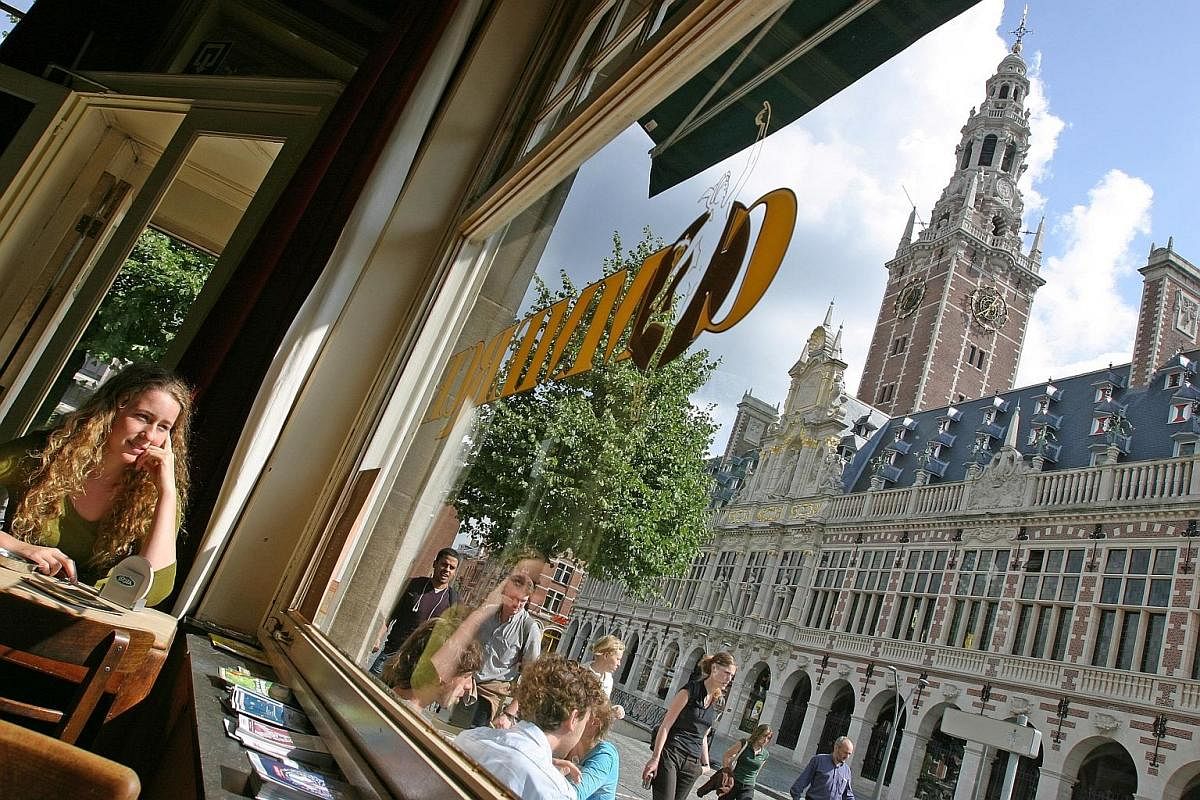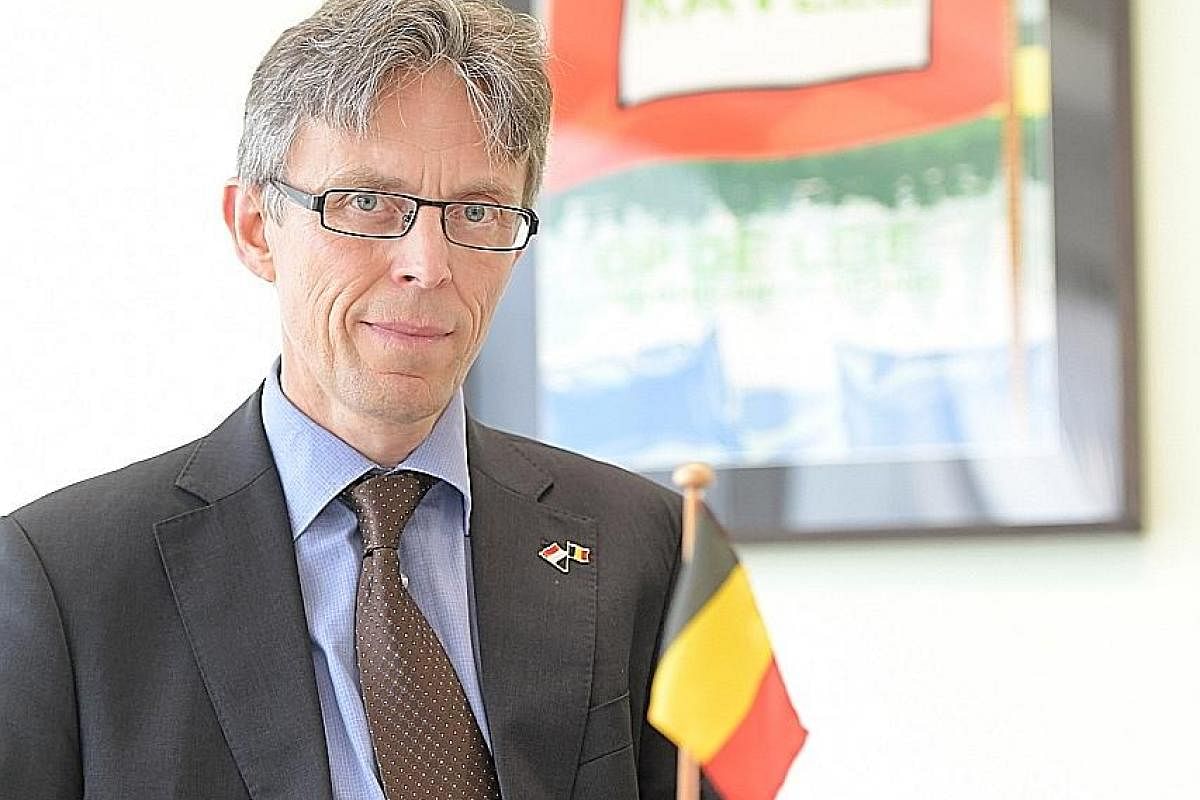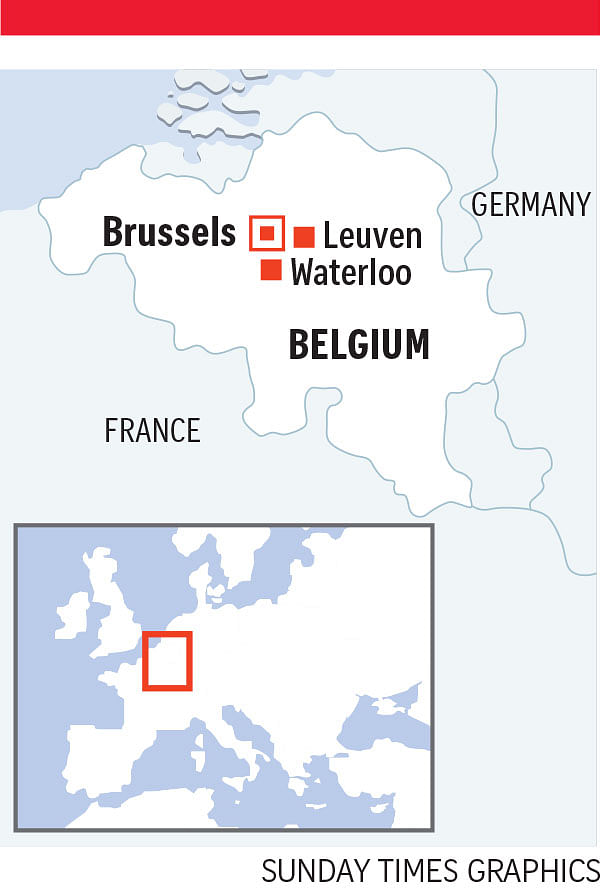-
GETTING THERE
-
There are several daily flights to Brussels Airport via various European airports, including Amsterdam, Frankfurt, Zurich, Helsinki and Munich. There is a direct train from the airport to Leuven, which takes just 15 minutes. Alternatively, after first visiting Brussels, travellers can either drive or take the train to Leuven, both of which take about 30 minutes. -
TIPS
-
• I would suggest that travellers take three days to thoroughly explore the city and its surroundings.
• Most tourist guides covering Belgium will have a chapter on Leuven, although I would discourage you from reading too much. Try to discover Leuven for yourself.
For some historical background, however, and to understand why so many buildings in Leuven date back only to the early 1920s, read War And Turpentine by Stefan Hertmans. Hertmans is one of Belgium's greatest poets and this book, which was listed among the 10 best reads of last year by The New York Times, is a retelling of his grandfather's diaries and stories of life on the front line in World War I.
• Leuven is very safe. Do be aware that this is a city that is "owned" by cyclists and when school is out, hundreds of cyclists will suddenly stream into the streets.
In an effort to ease congestion and make the city more bicycle-friendly, the town council has made through-traffic impossible. You are advised to park your car outside the centre.
Travel Black Book: Ambassadors series
Leuven: Belgian beer, chocs and more
The best of home: Ambassadors to Singapore provide an insider's guide to their favourite destinations


Who: Mr Gerard Cockx, 56, Ambassador of Belgium to Singapore
Favourite destination: My hometown, the city of Leuven (sometimes called Louvain), is a hidden gem where past meets present.
About 30km east of Brussels, Leuven is home to one of Europe's oldest universities as well as the headquarters of Anheuser-Busch InBev, the world's largest brewing company. One in three beers consumed worldwide are brewed by it.
The city came into its own in the 15th century with the founding of the University of Leuven in 1425 and the completion of the Town Hall in 1469. Built in late Gothic style with ornate architecture and intricate lace-like detail, the Town Hall is Leuven's pride and joy.
But the city is also young and vibrant. During the academic year, the city centre's population nearly doubles in size. It is also an innovative city, home to technology companies such as 3D-printing giant Materialize and nanotechnology pioneer IMEC.
SEE
Museum M (www.mleuven.be/en), in the centre of Leuven, was designed by renowned Belgian architect Stephane Beel. The sleek modern building incorporates the historic former science faculty building of the University of Leuven - a blend of old and new which describes the museum's art collection as well.
There are more than 52,000 pieces - art and objects from the Middle Ages to the 20th century - including paintings by the old masters such as Dirk Bouts and Rogier Van der Weyden, and a special focus on post-1945 Belgian art.

Travellers with a special interest in art by modern and contemporary Belgian artists should visit Galerie Dessers (galeriedessers.be/), a short walk from M.
For a nice view of the city centre, head to the bell tower of the university library. Belgium, and in particular nearby town Mechelen, is world-renowned for its carillon builders and players, and there is a carillon - a musical instrument made of bronze bells - inside the tower. Beautiful carillon concerts are played here in the summer.
For a view that takes in the whole city, climb to the public gardens of Keizersberg Abbey (www.keizersberg.be/), a Benedictine monastery built in the 19th century.
I love to people watch from the terrace of Cafe Metropole (www.cafemetropole.be), in the middle of the Old Market square. Locals quip that this cobblestone square, home to 45 pubs, is the world's largest bar.
EAT
Belgian food is said to be a mix of French quality and German quantity. It reflects our Burgundian lifestyle and is known for its quality, variety and the creative use of regional and seasonal ingredients.
In Leuven, I love to have a glass of Orval Trappist beer in Cafe Commerce (www.cafecommerce.be), across from the university library. This is where locals in-the-know meet for generous helpings of the cafe's soup of the day.
One cannot leave Belgium without trying a Belgian beer. Belgium is renowned for its variety and quality of beers, in particular its abbey-brewed ones, which are regular winners of international prizes. A beer costs €3 (S$4.60) or €4 in a local pub.
On a summer evening, you can sit on the cafe's terrace and listen to the carillon concerts coming from the Town Hall. A word of warning: this is a "slow cafe", so no Internet, only newspapers (yes, the paper versions).
Behind a nondescript facade, Het Land aan de Overkant, which means land on the other side, (www.hetlandaandeoverkant.be) is a Belgian restaurant which serves what it calls straightforward, uncomplicated, contemporary food. I particularly recommend the redfish with green asparagus, fennel and orange. They offer set meals at €42 for lunch and €60 for dinner.
Cafe Entrepot (www.cafeentrepot.be/) is a more budget-friendly option. The hip and cosy brasserie is in Leuven's newly developed docklands area, overlooking the water. It is part of Opek, an organisation that hosts cultural events, so the cafe frequently hosts concerts and art exhibitions. A meal here costs €10 to €20 a person.
Breakfast in Belgium typically means bread and pastries. Sunday morning is when most Belgians line up at their local bakeries to stock up on bread rolls, pies and croissants.
For a relaxed breakfast, go to Le Pain Quotidien, which means "daily bread" (www.lepainquotidien.be), a Belgian bakery and cafe chain.
PLAY
The best way to experience the local culture is to explore the town and its surroundings on foot or by bicycle. Connect with the locals and ask them for advice. Almost everyone speaks some English.
Walk or cycle to the Groot Begijnhof of Leuven, a 3ha town- within-a-town consisting of about 100 houses interspersed with a series of alleys, courtyards, and gardens in the city centre.
Dating back to the 13th century, the Groot Begijnhof is an old beguinage, a complex that was created to house beguines, unmarried women mostly from well-to-do families who devoted their lives to God. They devoted themselves to the sick and the poor, but did not take formal religious vows and were able to leave when they wanted. These beguinages were common in cities in Belgium and the Netherlands from the 12th to 18th centuries. I knew Leuven's last beguine in the 1970s. She died in 1988.
The beguinage, a Unesco World Heritage site, is now used by the university to house students and guest lecturers.
When it comes to festivals, travellers are spoilt for choice. Beer lovers should visit the Zythos Bierfestival (www.zbf.be) in April or the Leuven Innovation Beer Festival (www.leuveninnovationbeerfestival.com/) in June.
For more than 40 years, the Rock Werchter festival (www.rockwerchter.be/en), which takes place in summer, has hosted chart-topping as well as aspiring bands. This year's festival, from June 29 to July 2, is headlined by the Foo Fighters, Radiohead and Lorde.
For history buffs, I recommend a side trip to Waterloo, the site of Napoleon's final defeat on June 18, 1815, and an hour's drive south of Leuven. Climb to the giant lion statue for a breathtaking view of the battlefield. A reenactment of the battle is held there in June.
If you are travelling with kids, go to Aqualibi water park (www.walibi.com/aqualibi-landing) in nearby Wavre and enjoy the water slides.
SHOP
Take a 1km stroll along Bondgenotenlaan Street and back down Diestsestraat Street (or vice-versa) between the Town Hall and the train station, where you will find a variety of shops selling clothes, shoes and books, among other things.
On Fridays, people shop at Leuven's largest market around Monseigneur Ladeuzeplein and Hooverplein. Every Saturday, there is a flea market near the Grote Markt (Mechelsestraat), and a flower market in the pedestrian-only section of the Brusselsestraat.
My favourite store is Kaasmeester (Cheese Master) Elsen (www.elsenkaasambacht.be), where you can get expert advice on artisanal cheeses, terroir and everything else you always wanted to know about cheese.
I recommend the Maredsous cheese, a semi-hard loaf-shaped cow's milk cheese that is matured in the cellars of the local Maredsous Abbey. Enjoy it with a glass of Maredsous abbey beer.
Belgian chocolates also make great souvenirs. The boutique confectionery Think Chocolate! (www.thinkchocolate.be) offers unique chocolate creations.
You will also see the Fonske, a small statue of a student holding a book and a glass of beer, which is the symbol for this university town. Fons is a popular Flemish name, as well as an abbreviation of "fons sapientiae", Latin for fount of wisdom. You can buy boxes of handmade chocolate Fonskes, made of 100 per cent Belgian chocolate (€11 for 250g, €17 for 500g).
STAY
My favourite place to stay is Martin's Klooster (www.martinshotels.com/en/hotel/klooster-hotel), a four-star hotel in the historical centre of Leuven.
The heritage listed building used to be a monastery with an infirmary and guest lodgings for pilgrims, which have been converted into hotel suites. Rooms start at €149 a night.
Join ST's Telegram channel and get the latest breaking news delivered to you.
A version of this article appeared in the print edition of The Sunday Times on May 07, 2017, with the headline Leuven: Belgian beer, chocs and more. Subscribe

